Organisational Behaviour Report: Motivation, Teams, and Concepts
VerifiedAdded on 2020/11/23
|15
|4908
|324
Report
AI Summary
This report analyzes organisational behaviour within David Michael & Co., a UK-based food and beverage company. It examines how organizational culture, power dynamics, and workplace politics influence individual and team performance. The report applies content and process theories of motivation, particularly Maslow's hierarchy, to explain how employee needs can be met to achieve organizational goals. Furthermore, it contrasts effective and ineffective team structures, emphasizing the importance of task culture and team-based approaches. The report also discusses the positive and negative impacts of various organizational behaviours, providing insights into fostering a productive and motivated workforce. The report concludes by assessing how concepts of organizational behaviour can be applied to create an effective team environment that drives organizational success.
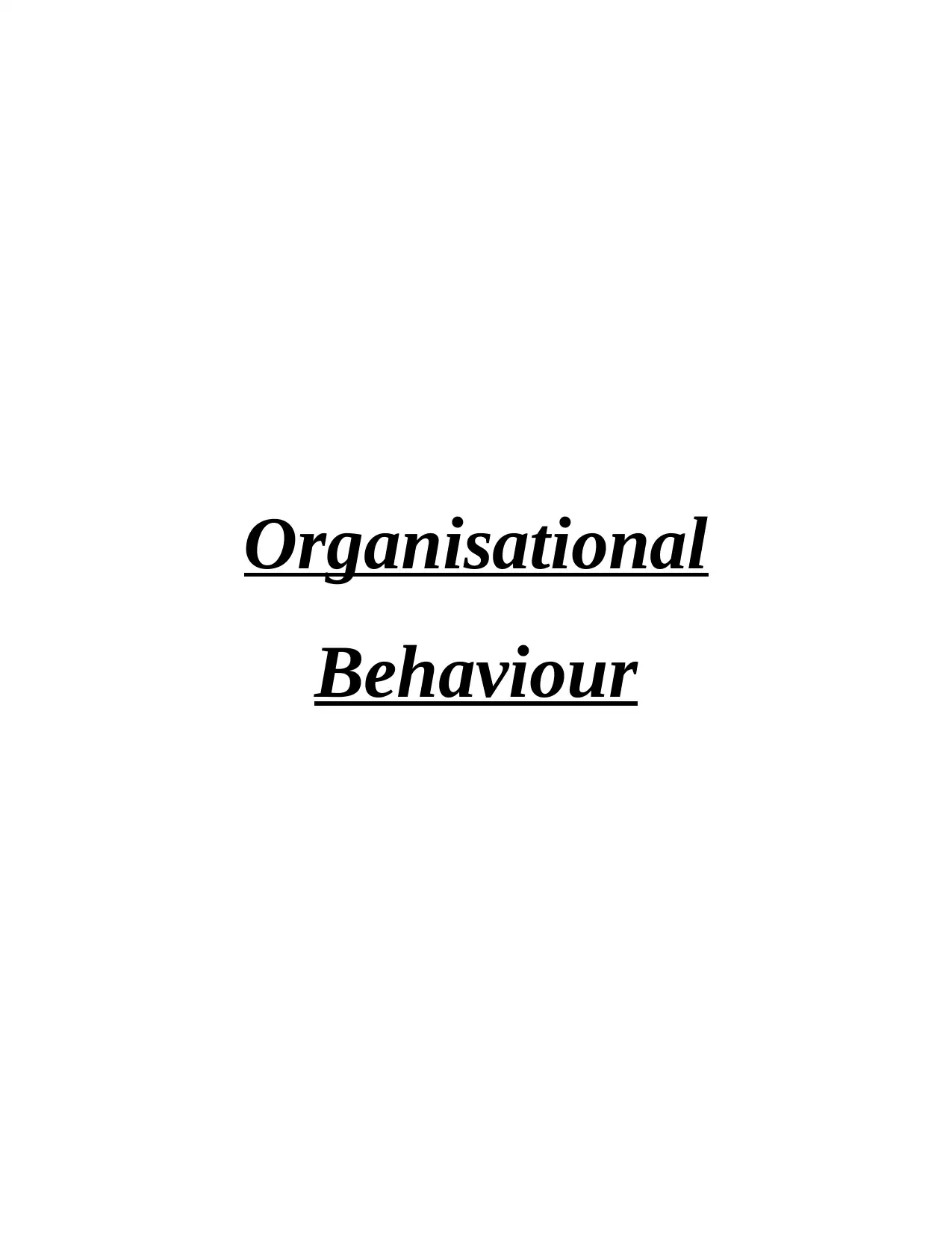
Organisational
Behaviour
Behaviour
Paraphrase This Document
Need a fresh take? Get an instant paraphrase of this document with our AI Paraphraser
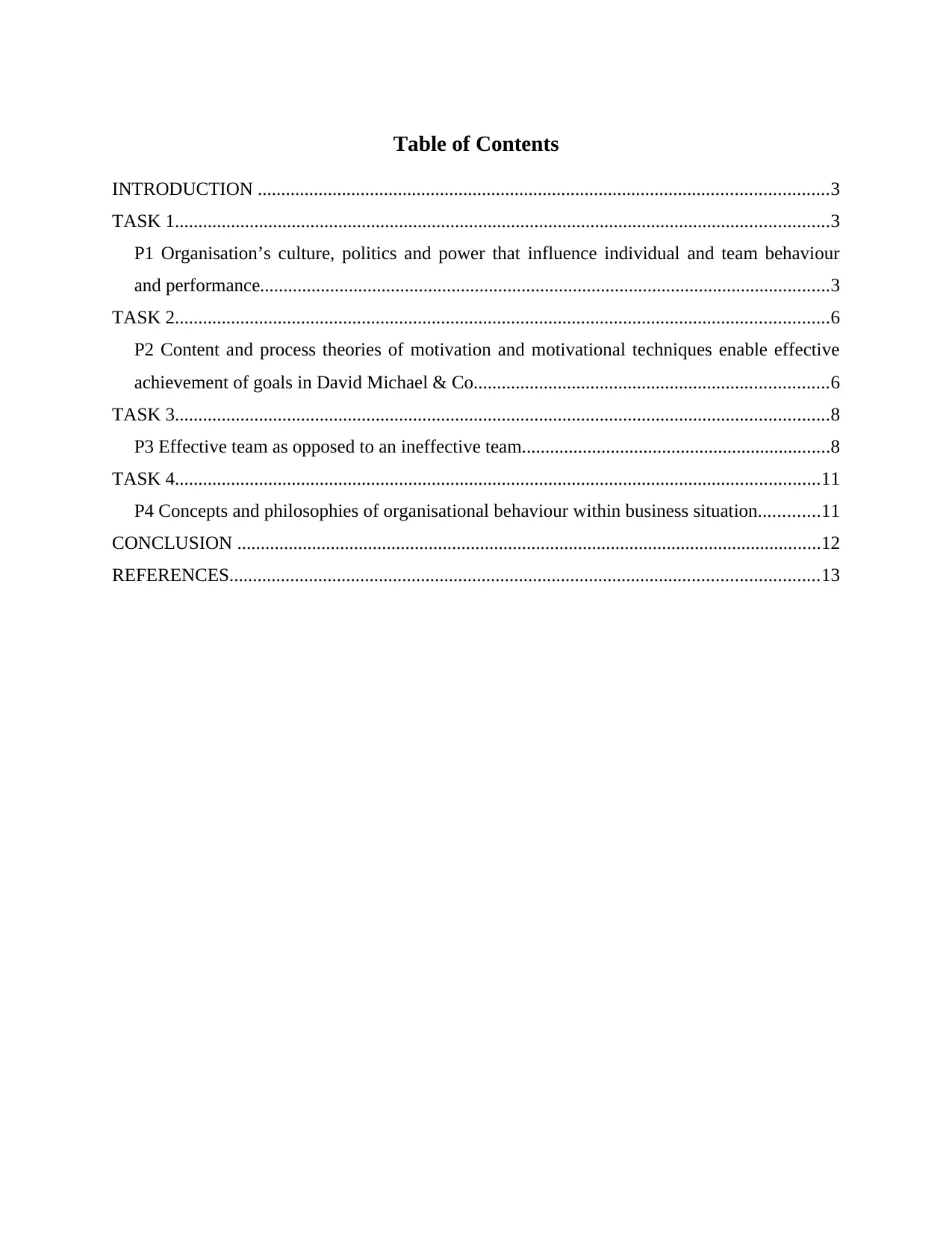
Table of Contents
INTRODUCTION ..........................................................................................................................3
TASK 1............................................................................................................................................3
P1 Organisation’s culture, politics and power that influence individual and team behaviour
and performance..........................................................................................................................3
TASK 2............................................................................................................................................6
P2 Content and process theories of motivation and motivational techniques enable effective
achievement of goals in David Michael & Co............................................................................6
TASK 3............................................................................................................................................8
P3 Effective team as opposed to an ineffective team..................................................................8
TASK 4..........................................................................................................................................11
P4 Concepts and philosophies of organisational behaviour within business situation.............11
CONCLUSION .............................................................................................................................12
REFERENCES..............................................................................................................................13
INTRODUCTION ..........................................................................................................................3
TASK 1............................................................................................................................................3
P1 Organisation’s culture, politics and power that influence individual and team behaviour
and performance..........................................................................................................................3
TASK 2............................................................................................................................................6
P2 Content and process theories of motivation and motivational techniques enable effective
achievement of goals in David Michael & Co............................................................................6
TASK 3............................................................................................................................................8
P3 Effective team as opposed to an ineffective team..................................................................8
TASK 4..........................................................................................................................................11
P4 Concepts and philosophies of organisational behaviour within business situation.............11
CONCLUSION .............................................................................................................................12
REFERENCES..............................................................................................................................13
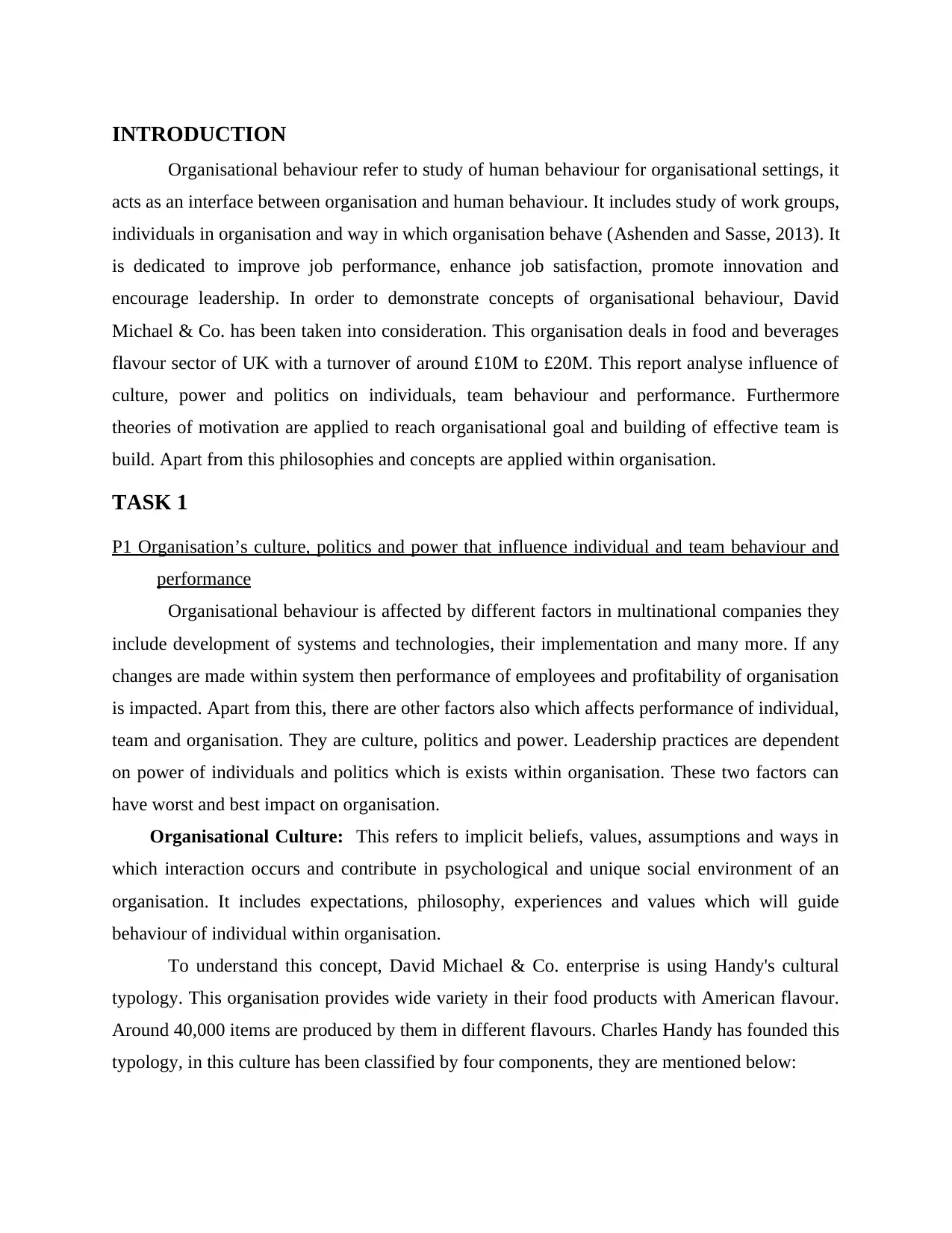
INTRODUCTION
Organisational behaviour refer to study of human behaviour for organisational settings, it
acts as an interface between organisation and human behaviour. It includes study of work groups,
individuals in organisation and way in which organisation behave (Ashenden and Sasse, 2013). It
is dedicated to improve job performance, enhance job satisfaction, promote innovation and
encourage leadership. In order to demonstrate concepts of organisational behaviour, David
Michael & Co. has been taken into consideration. This organisation deals in food and beverages
flavour sector of UK with a turnover of around £10M to £20M. This report analyse influence of
culture, power and politics on individuals, team behaviour and performance. Furthermore
theories of motivation are applied to reach organisational goal and building of effective team is
build. Apart from this philosophies and concepts are applied within organisation.
TASK 1
P1 Organisation’s culture, politics and power that influence individual and team behaviour and
performance
Organisational behaviour is affected by different factors in multinational companies they
include development of systems and technologies, their implementation and many more. If any
changes are made within system then performance of employees and profitability of organisation
is impacted. Apart from this, there are other factors also which affects performance of individual,
team and organisation. They are culture, politics and power. Leadership practices are dependent
on power of individuals and politics which is exists within organisation. These two factors can
have worst and best impact on organisation.
Organisational Culture: This refers to implicit beliefs, values, assumptions and ways in
which interaction occurs and contribute in psychological and unique social environment of an
organisation. It includes expectations, philosophy, experiences and values which will guide
behaviour of individual within organisation.
To understand this concept, David Michael & Co. enterprise is using Handy's cultural
typology. This organisation provides wide variety in their food products with American flavour.
Around 40,000 items are produced by them in different flavours. Charles Handy has founded this
typology, in this culture has been classified by four components, they are mentioned below:
Organisational behaviour refer to study of human behaviour for organisational settings, it
acts as an interface between organisation and human behaviour. It includes study of work groups,
individuals in organisation and way in which organisation behave (Ashenden and Sasse, 2013). It
is dedicated to improve job performance, enhance job satisfaction, promote innovation and
encourage leadership. In order to demonstrate concepts of organisational behaviour, David
Michael & Co. has been taken into consideration. This organisation deals in food and beverages
flavour sector of UK with a turnover of around £10M to £20M. This report analyse influence of
culture, power and politics on individuals, team behaviour and performance. Furthermore
theories of motivation are applied to reach organisational goal and building of effective team is
build. Apart from this philosophies and concepts are applied within organisation.
TASK 1
P1 Organisation’s culture, politics and power that influence individual and team behaviour and
performance
Organisational behaviour is affected by different factors in multinational companies they
include development of systems and technologies, their implementation and many more. If any
changes are made within system then performance of employees and profitability of organisation
is impacted. Apart from this, there are other factors also which affects performance of individual,
team and organisation. They are culture, politics and power. Leadership practices are dependent
on power of individuals and politics which is exists within organisation. These two factors can
have worst and best impact on organisation.
Organisational Culture: This refers to implicit beliefs, values, assumptions and ways in
which interaction occurs and contribute in psychological and unique social environment of an
organisation. It includes expectations, philosophy, experiences and values which will guide
behaviour of individual within organisation.
To understand this concept, David Michael & Co. enterprise is using Handy's cultural
typology. This organisation provides wide variety in their food products with American flavour.
Around 40,000 items are produced by them in different flavours. Charles Handy has founded this
typology, in this culture has been classified by four components, they are mentioned below:
⊘ This is a preview!⊘
Do you want full access?
Subscribe today to unlock all pages.

Trusted by 1+ million students worldwide
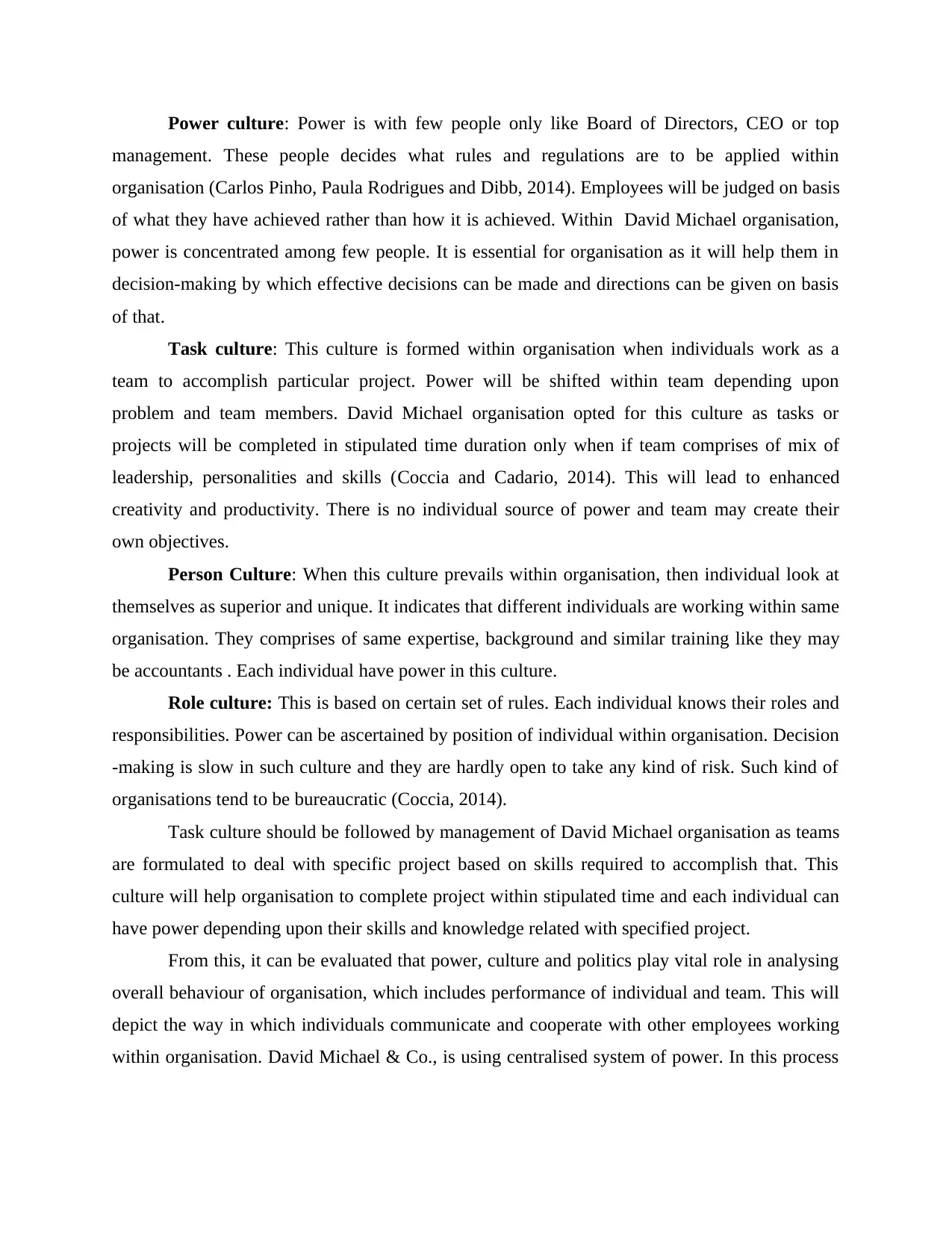
Power culture: Power is with few people only like Board of Directors, CEO or top
management. These people decides what rules and regulations are to be applied within
organisation (Carlos Pinho, Paula Rodrigues and Dibb, 2014). Employees will be judged on basis
of what they have achieved rather than how it is achieved. Within David Michael organisation,
power is concentrated among few people. It is essential for organisation as it will help them in
decision-making by which effective decisions can be made and directions can be given on basis
of that.
Task culture: This culture is formed within organisation when individuals work as a
team to accomplish particular project. Power will be shifted within team depending upon
problem and team members. David Michael organisation opted for this culture as tasks or
projects will be completed in stipulated time duration only when if team comprises of mix of
leadership, personalities and skills (Coccia and Cadario, 2014). This will lead to enhanced
creativity and productivity. There is no individual source of power and team may create their
own objectives.
Person Culture: When this culture prevails within organisation, then individual look at
themselves as superior and unique. It indicates that different individuals are working within same
organisation. They comprises of same expertise, background and similar training like they may
be accountants . Each individual have power in this culture.
Role culture: This is based on certain set of rules. Each individual knows their roles and
responsibilities. Power can be ascertained by position of individual within organisation. Decision
-making is slow in such culture and they are hardly open to take any kind of risk. Such kind of
organisations tend to be bureaucratic (Coccia, 2014).
Task culture should be followed by management of David Michael organisation as teams
are formulated to deal with specific project based on skills required to accomplish that. This
culture will help organisation to complete project within stipulated time and each individual can
have power depending upon their skills and knowledge related with specified project.
From this, it can be evaluated that power, culture and politics play vital role in analysing
overall behaviour of organisation, which includes performance of individual and team. This will
depict the way in which individuals communicate and cooperate with other employees working
within organisation. David Michael & Co., is using centralised system of power. In this process
management. These people decides what rules and regulations are to be applied within
organisation (Carlos Pinho, Paula Rodrigues and Dibb, 2014). Employees will be judged on basis
of what they have achieved rather than how it is achieved. Within David Michael organisation,
power is concentrated among few people. It is essential for organisation as it will help them in
decision-making by which effective decisions can be made and directions can be given on basis
of that.
Task culture: This culture is formed within organisation when individuals work as a
team to accomplish particular project. Power will be shifted within team depending upon
problem and team members. David Michael organisation opted for this culture as tasks or
projects will be completed in stipulated time duration only when if team comprises of mix of
leadership, personalities and skills (Coccia and Cadario, 2014). This will lead to enhanced
creativity and productivity. There is no individual source of power and team may create their
own objectives.
Person Culture: When this culture prevails within organisation, then individual look at
themselves as superior and unique. It indicates that different individuals are working within same
organisation. They comprises of same expertise, background and similar training like they may
be accountants . Each individual have power in this culture.
Role culture: This is based on certain set of rules. Each individual knows their roles and
responsibilities. Power can be ascertained by position of individual within organisation. Decision
-making is slow in such culture and they are hardly open to take any kind of risk. Such kind of
organisations tend to be bureaucratic (Coccia, 2014).
Task culture should be followed by management of David Michael organisation as teams
are formulated to deal with specific project based on skills required to accomplish that. This
culture will help organisation to complete project within stipulated time and each individual can
have power depending upon their skills and knowledge related with specified project.
From this, it can be evaluated that power, culture and politics play vital role in analysing
overall behaviour of organisation, which includes performance of individual and team. This will
depict the way in which individuals communicate and cooperate with other employees working
within organisation. David Michael & Co., is using centralised system of power. In this process
Paraphrase This Document
Need a fresh take? Get an instant paraphrase of this document with our AI Paraphraser
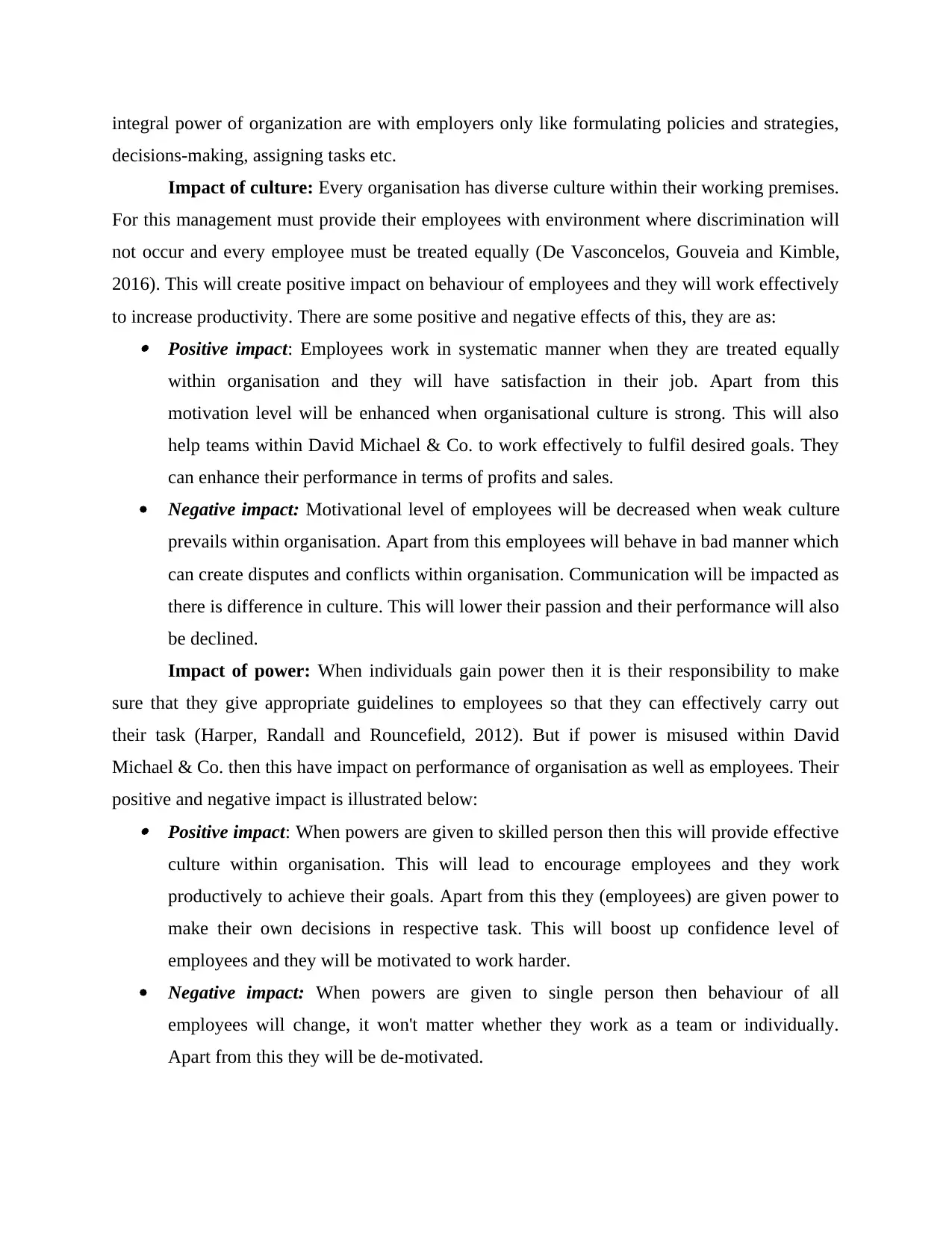
integral power of organization are with employers only like formulating policies and strategies,
decisions-making, assigning tasks etc.
Impact of culture: Every organisation has diverse culture within their working premises.
For this management must provide their employees with environment where discrimination will
not occur and every employee must be treated equally (De Vasconcelos, Gouveia and Kimble,
2016). This will create positive impact on behaviour of employees and they will work effectively
to increase productivity. There are some positive and negative effects of this, they are as: Positive impact: Employees work in systematic manner when they are treated equally
within organisation and they will have satisfaction in their job. Apart from this
motivation level will be enhanced when organisational culture is strong. This will also
help teams within David Michael & Co. to work effectively to fulfil desired goals. They
can enhance their performance in terms of profits and sales.
Negative impact: Motivational level of employees will be decreased when weak culture
prevails within organisation. Apart from this employees will behave in bad manner which
can create disputes and conflicts within organisation. Communication will be impacted as
there is difference in culture. This will lower their passion and their performance will also
be declined.
Impact of power: When individuals gain power then it is their responsibility to make
sure that they give appropriate guidelines to employees so that they can effectively carry out
their task (Harper, Randall and Rouncefield, 2012). But if power is misused within David
Michael & Co. then this have impact on performance of organisation as well as employees. Their
positive and negative impact is illustrated below: Positive impact: When powers are given to skilled person then this will provide effective
culture within organisation. This will lead to encourage employees and they work
productively to achieve their goals. Apart from this they (employees) are given power to
make their own decisions in respective task. This will boost up confidence level of
employees and they will be motivated to work harder.
Negative impact: When powers are given to single person then behaviour of all
employees will change, it won't matter whether they work as a team or individually.
Apart from this they will be de-motivated.
decisions-making, assigning tasks etc.
Impact of culture: Every organisation has diverse culture within their working premises.
For this management must provide their employees with environment where discrimination will
not occur and every employee must be treated equally (De Vasconcelos, Gouveia and Kimble,
2016). This will create positive impact on behaviour of employees and they will work effectively
to increase productivity. There are some positive and negative effects of this, they are as: Positive impact: Employees work in systematic manner when they are treated equally
within organisation and they will have satisfaction in their job. Apart from this
motivation level will be enhanced when organisational culture is strong. This will also
help teams within David Michael & Co. to work effectively to fulfil desired goals. They
can enhance their performance in terms of profits and sales.
Negative impact: Motivational level of employees will be decreased when weak culture
prevails within organisation. Apart from this employees will behave in bad manner which
can create disputes and conflicts within organisation. Communication will be impacted as
there is difference in culture. This will lower their passion and their performance will also
be declined.
Impact of power: When individuals gain power then it is their responsibility to make
sure that they give appropriate guidelines to employees so that they can effectively carry out
their task (Harper, Randall and Rouncefield, 2012). But if power is misused within David
Michael & Co. then this have impact on performance of organisation as well as employees. Their
positive and negative impact is illustrated below: Positive impact: When powers are given to skilled person then this will provide effective
culture within organisation. This will lead to encourage employees and they work
productively to achieve their goals. Apart from this they (employees) are given power to
make their own decisions in respective task. This will boost up confidence level of
employees and they will be motivated to work harder.
Negative impact: When powers are given to single person then behaviour of all
employees will change, it won't matter whether they work as a team or individually.
Apart from this they will be de-motivated.
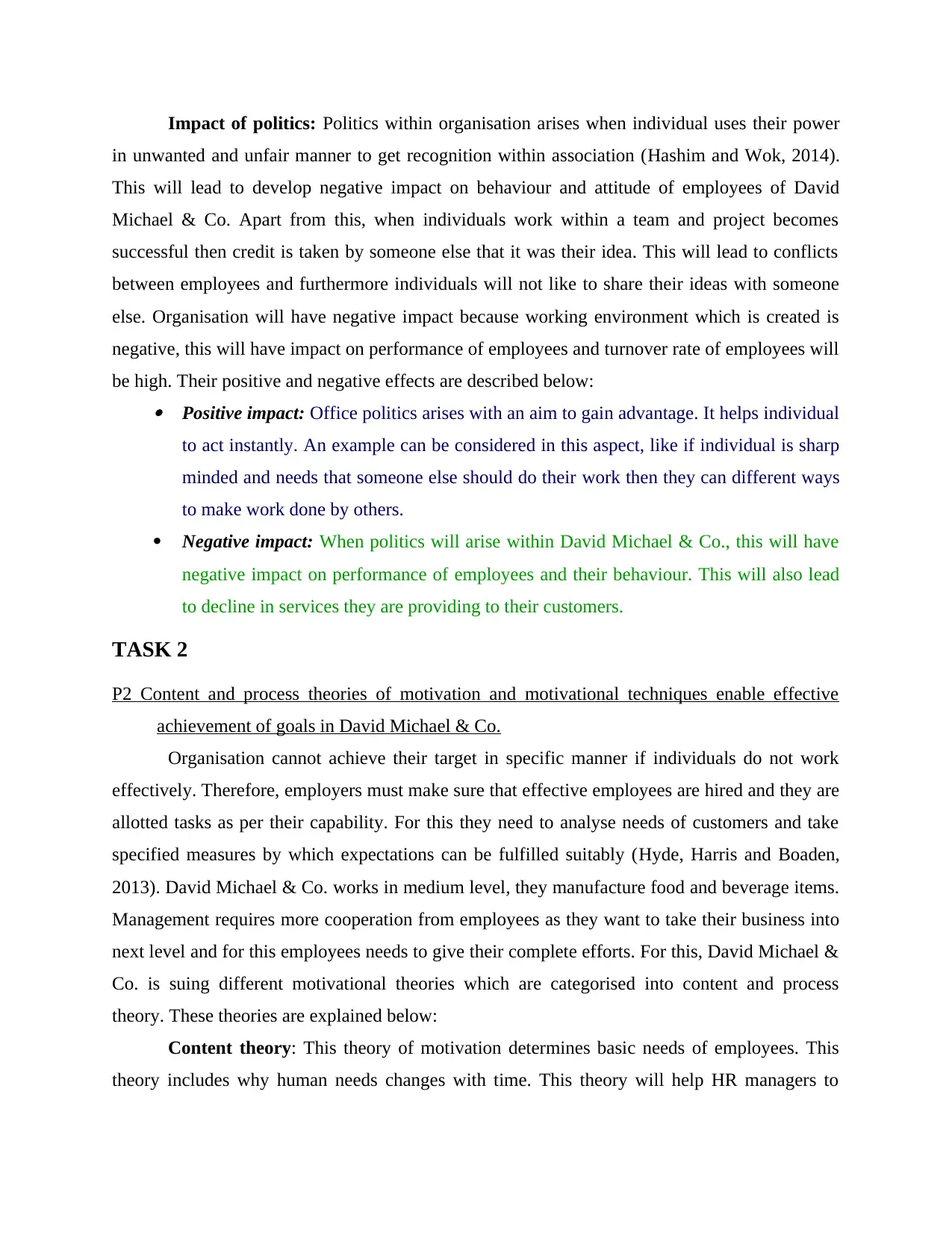
Impact of politics: Politics within organisation arises when individual uses their power
in unwanted and unfair manner to get recognition within association (Hashim and Wok, 2014).
This will lead to develop negative impact on behaviour and attitude of employees of David
Michael & Co. Apart from this, when individuals work within a team and project becomes
successful then credit is taken by someone else that it was their idea. This will lead to conflicts
between employees and furthermore individuals will not like to share their ideas with someone
else. Organisation will have negative impact because working environment which is created is
negative, this will have impact on performance of employees and turnover rate of employees will
be high. Their positive and negative effects are described below: Positive impact: Office politics arises with an aim to gain advantage. It helps individual
to act instantly. An example can be considered in this aspect, like if individual is sharp
minded and needs that someone else should do their work then they can different ways
to make work done by others.
Negative impact: When politics will arise within David Michael & Co., this will have
negative impact on performance of employees and their behaviour. This will also lead
to decline in services they are providing to their customers.
TASK 2
P2 Content and process theories of motivation and motivational techniques enable effective
achievement of goals in David Michael & Co.
Organisation cannot achieve their target in specific manner if individuals do not work
effectively. Therefore, employers must make sure that effective employees are hired and they are
allotted tasks as per their capability. For this they need to analyse needs of customers and take
specified measures by which expectations can be fulfilled suitably (Hyde, Harris and Boaden,
2013). David Michael & Co. works in medium level, they manufacture food and beverage items.
Management requires more cooperation from employees as they want to take their business into
next level and for this employees needs to give their complete efforts. For this, David Michael &
Co. is suing different motivational theories which are categorised into content and process
theory. These theories are explained below:
Content theory: This theory of motivation determines basic needs of employees. This
theory includes why human needs changes with time. This theory will help HR managers to
in unwanted and unfair manner to get recognition within association (Hashim and Wok, 2014).
This will lead to develop negative impact on behaviour and attitude of employees of David
Michael & Co. Apart from this, when individuals work within a team and project becomes
successful then credit is taken by someone else that it was their idea. This will lead to conflicts
between employees and furthermore individuals will not like to share their ideas with someone
else. Organisation will have negative impact because working environment which is created is
negative, this will have impact on performance of employees and turnover rate of employees will
be high. Their positive and negative effects are described below: Positive impact: Office politics arises with an aim to gain advantage. It helps individual
to act instantly. An example can be considered in this aspect, like if individual is sharp
minded and needs that someone else should do their work then they can different ways
to make work done by others.
Negative impact: When politics will arise within David Michael & Co., this will have
negative impact on performance of employees and their behaviour. This will also lead
to decline in services they are providing to their customers.
TASK 2
P2 Content and process theories of motivation and motivational techniques enable effective
achievement of goals in David Michael & Co.
Organisation cannot achieve their target in specific manner if individuals do not work
effectively. Therefore, employers must make sure that effective employees are hired and they are
allotted tasks as per their capability. For this they need to analyse needs of customers and take
specified measures by which expectations can be fulfilled suitably (Hyde, Harris and Boaden,
2013). David Michael & Co. works in medium level, they manufacture food and beverage items.
Management requires more cooperation from employees as they want to take their business into
next level and for this employees needs to give their complete efforts. For this, David Michael &
Co. is suing different motivational theories which are categorised into content and process
theory. These theories are explained below:
Content theory: This theory of motivation determines basic needs of employees. This
theory includes why human needs changes with time. This theory will help HR managers to
⊘ This is a preview!⊘
Do you want full access?
Subscribe today to unlock all pages.

Trusted by 1+ million students worldwide
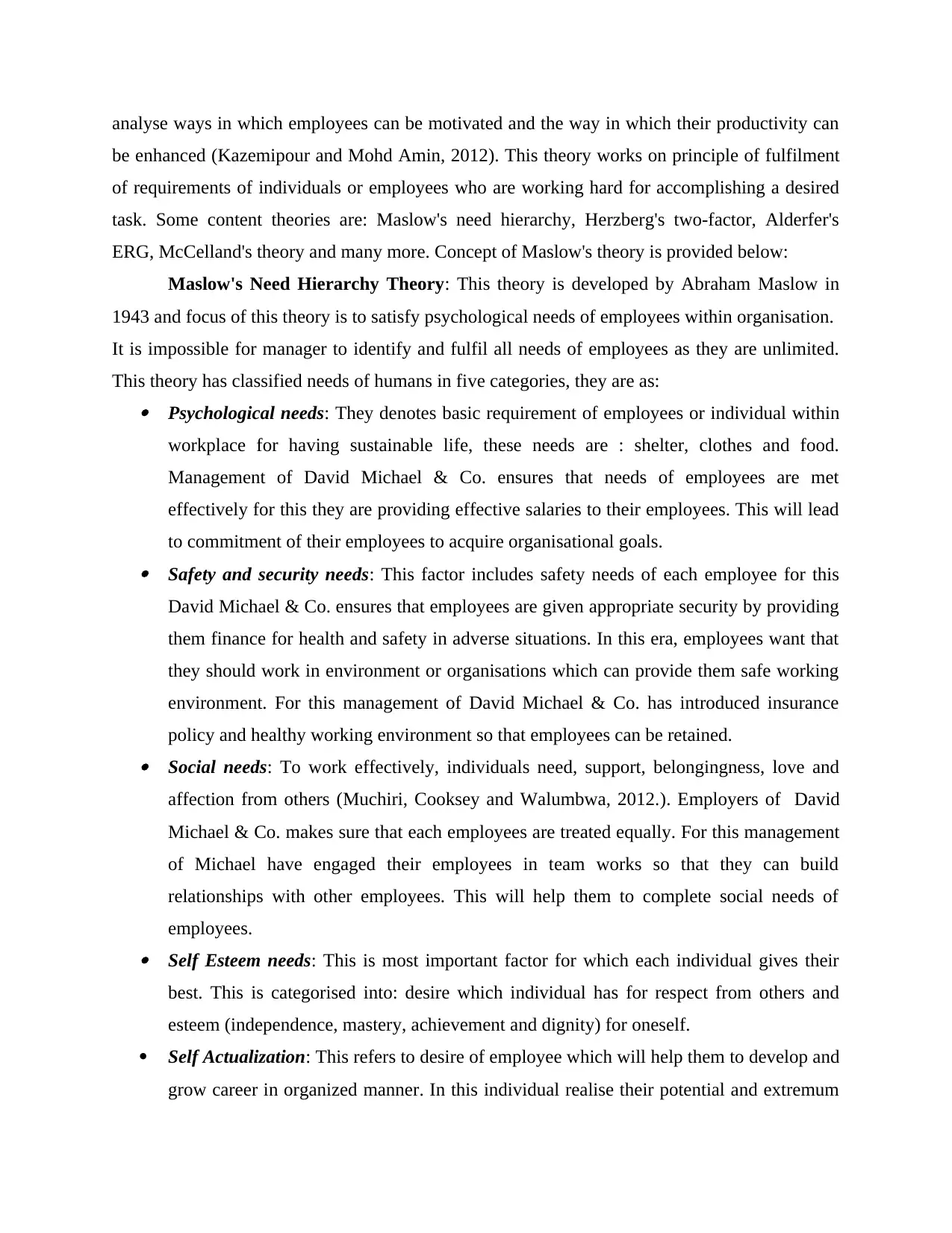
analyse ways in which employees can be motivated and the way in which their productivity can
be enhanced (Kazemipour and Mohd Amin, 2012). This theory works on principle of fulfilment
of requirements of individuals or employees who are working hard for accomplishing a desired
task. Some content theories are: Maslow's need hierarchy, Herzberg's two-factor, Alderfer's
ERG, McCelland's theory and many more. Concept of Maslow's theory is provided below:
Maslow's Need Hierarchy Theory: This theory is developed by Abraham Maslow in
1943 and focus of this theory is to satisfy psychological needs of employees within organisation.
It is impossible for manager to identify and fulfil all needs of employees as they are unlimited.
This theory has classified needs of humans in five categories, they are as: Psychological needs: They denotes basic requirement of employees or individual within
workplace for having sustainable life, these needs are : shelter, clothes and food.
Management of David Michael & Co. ensures that needs of employees are met
effectively for this they are providing effective salaries to their employees. This will lead
to commitment of their employees to acquire organisational goals. Safety and security needs: This factor includes safety needs of each employee for this
David Michael & Co. ensures that employees are given appropriate security by providing
them finance for health and safety in adverse situations. In this era, employees want that
they should work in environment or organisations which can provide them safe working
environment. For this management of David Michael & Co. has introduced insurance
policy and healthy working environment so that employees can be retained. Social needs: To work effectively, individuals need, support, belongingness, love and
affection from others (Muchiri, Cooksey and Walumbwa, 2012.). Employers of David
Michael & Co. makes sure that each employees are treated equally. For this management
of Michael have engaged their employees in team works so that they can build
relationships with other employees. This will help them to complete social needs of
employees. Self Esteem needs: This is most important factor for which each individual gives their
best. This is categorised into: desire which individual has for respect from others and
esteem (independence, mastery, achievement and dignity) for oneself.
Self Actualization: This refers to desire of employee which will help them to develop and
grow career in organized manner. In this individual realise their potential and extremum
be enhanced (Kazemipour and Mohd Amin, 2012). This theory works on principle of fulfilment
of requirements of individuals or employees who are working hard for accomplishing a desired
task. Some content theories are: Maslow's need hierarchy, Herzberg's two-factor, Alderfer's
ERG, McCelland's theory and many more. Concept of Maslow's theory is provided below:
Maslow's Need Hierarchy Theory: This theory is developed by Abraham Maslow in
1943 and focus of this theory is to satisfy psychological needs of employees within organisation.
It is impossible for manager to identify and fulfil all needs of employees as they are unlimited.
This theory has classified needs of humans in five categories, they are as: Psychological needs: They denotes basic requirement of employees or individual within
workplace for having sustainable life, these needs are : shelter, clothes and food.
Management of David Michael & Co. ensures that needs of employees are met
effectively for this they are providing effective salaries to their employees. This will lead
to commitment of their employees to acquire organisational goals. Safety and security needs: This factor includes safety needs of each employee for this
David Michael & Co. ensures that employees are given appropriate security by providing
them finance for health and safety in adverse situations. In this era, employees want that
they should work in environment or organisations which can provide them safe working
environment. For this management of David Michael & Co. has introduced insurance
policy and healthy working environment so that employees can be retained. Social needs: To work effectively, individuals need, support, belongingness, love and
affection from others (Muchiri, Cooksey and Walumbwa, 2012.). Employers of David
Michael & Co. makes sure that each employees are treated equally. For this management
of Michael have engaged their employees in team works so that they can build
relationships with other employees. This will help them to complete social needs of
employees. Self Esteem needs: This is most important factor for which each individual gives their
best. This is categorised into: desire which individual has for respect from others and
esteem (independence, mastery, achievement and dignity) for oneself.
Self Actualization: This refers to desire of employee which will help them to develop and
grow career in organized manner. In this individual realise their potential and extremum
Paraphrase This Document
Need a fresh take? Get an instant paraphrase of this document with our AI Paraphraser
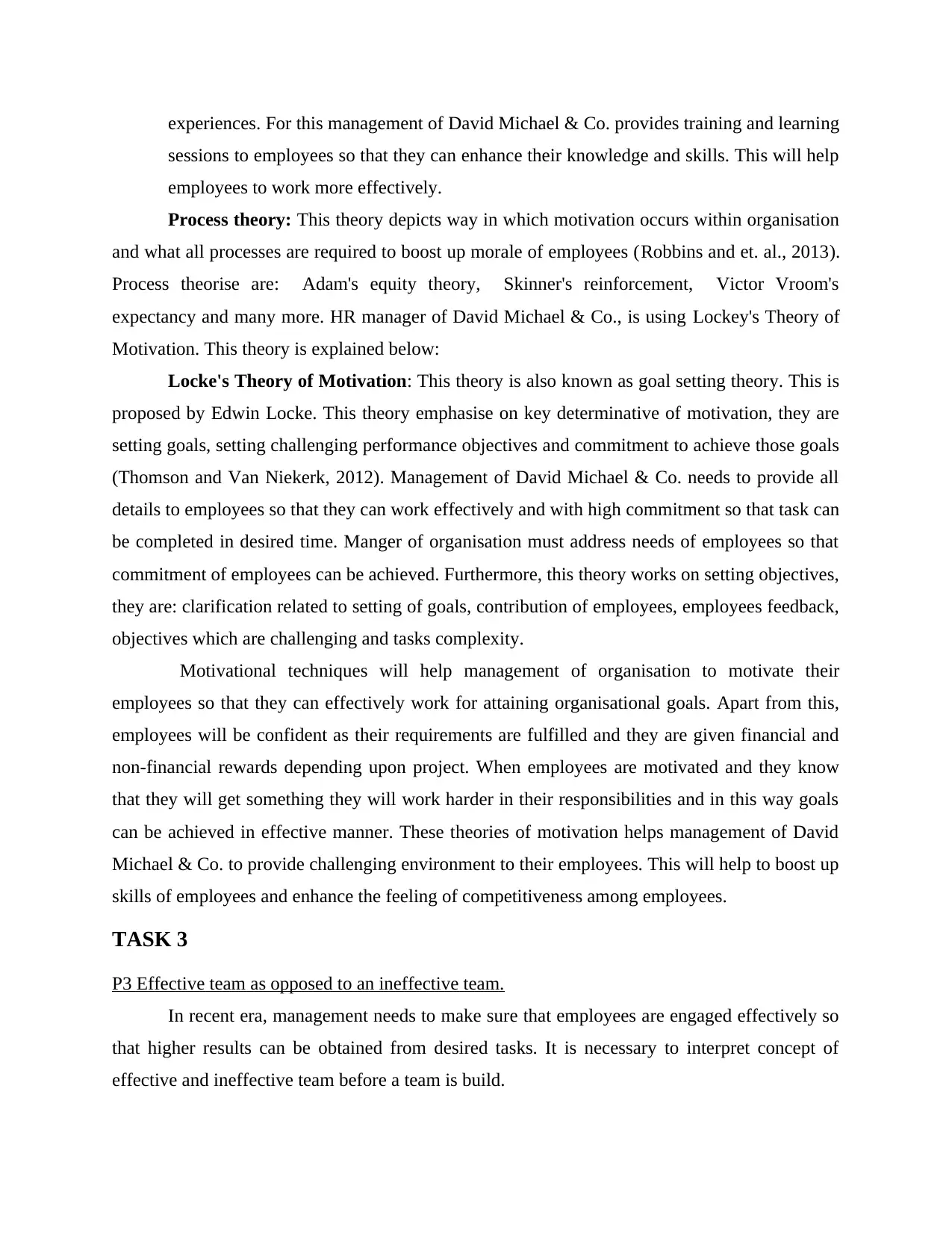
experiences. For this management of David Michael & Co. provides training and learning
sessions to employees so that they can enhance their knowledge and skills. This will help
employees to work more effectively.
Process theory: This theory depicts way in which motivation occurs within organisation
and what all processes are required to boost up morale of employees (Robbins and et. al., 2013).
Process theorise are: Adam's equity theory, Skinner's reinforcement, Victor Vroom's
expectancy and many more. HR manager of David Michael & Co., is using Lockey's Theory of
Motivation. This theory is explained below:
Locke's Theory of Motivation: This theory is also known as goal setting theory. This is
proposed by Edwin Locke. This theory emphasise on key determinative of motivation, they are
setting goals, setting challenging performance objectives and commitment to achieve those goals
(Thomson and Van Niekerk, 2012). Management of David Michael & Co. needs to provide all
details to employees so that they can work effectively and with high commitment so that task can
be completed in desired time. Manger of organisation must address needs of employees so that
commitment of employees can be achieved. Furthermore, this theory works on setting objectives,
they are: clarification related to setting of goals, contribution of employees, employees feedback,
objectives which are challenging and tasks complexity.
Motivational techniques will help management of organisation to motivate their
employees so that they can effectively work for attaining organisational goals. Apart from this,
employees will be confident as their requirements are fulfilled and they are given financial and
non-financial rewards depending upon project. When employees are motivated and they know
that they will get something they will work harder in their responsibilities and in this way goals
can be achieved in effective manner. These theories of motivation helps management of David
Michael & Co. to provide challenging environment to their employees. This will help to boost up
skills of employees and enhance the feeling of competitiveness among employees.
TASK 3
P3 Effective team as opposed to an ineffective team.
In recent era, management needs to make sure that employees are engaged effectively so
that higher results can be obtained from desired tasks. It is necessary to interpret concept of
effective and ineffective team before a team is build.
sessions to employees so that they can enhance their knowledge and skills. This will help
employees to work more effectively.
Process theory: This theory depicts way in which motivation occurs within organisation
and what all processes are required to boost up morale of employees (Robbins and et. al., 2013).
Process theorise are: Adam's equity theory, Skinner's reinforcement, Victor Vroom's
expectancy and many more. HR manager of David Michael & Co., is using Lockey's Theory of
Motivation. This theory is explained below:
Locke's Theory of Motivation: This theory is also known as goal setting theory. This is
proposed by Edwin Locke. This theory emphasise on key determinative of motivation, they are
setting goals, setting challenging performance objectives and commitment to achieve those goals
(Thomson and Van Niekerk, 2012). Management of David Michael & Co. needs to provide all
details to employees so that they can work effectively and with high commitment so that task can
be completed in desired time. Manger of organisation must address needs of employees so that
commitment of employees can be achieved. Furthermore, this theory works on setting objectives,
they are: clarification related to setting of goals, contribution of employees, employees feedback,
objectives which are challenging and tasks complexity.
Motivational techniques will help management of organisation to motivate their
employees so that they can effectively work for attaining organisational goals. Apart from this,
employees will be confident as their requirements are fulfilled and they are given financial and
non-financial rewards depending upon project. When employees are motivated and they know
that they will get something they will work harder in their responsibilities and in this way goals
can be achieved in effective manner. These theories of motivation helps management of David
Michael & Co. to provide challenging environment to their employees. This will help to boost up
skills of employees and enhance the feeling of competitiveness among employees.
TASK 3
P3 Effective team as opposed to an ineffective team.
In recent era, management needs to make sure that employees are engaged effectively so
that higher results can be obtained from desired tasks. It is necessary to interpret concept of
effective and ineffective team before a team is build.
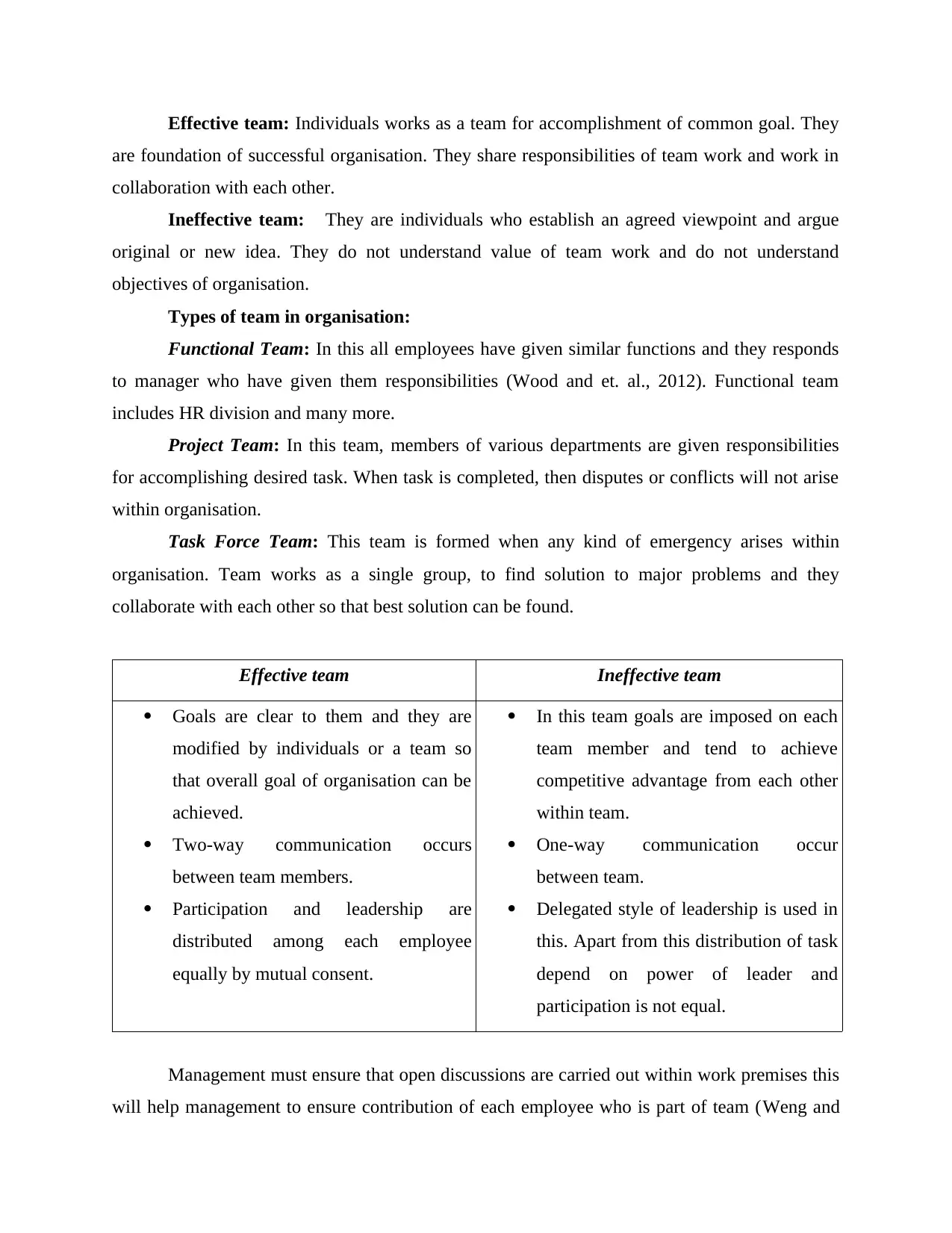
Effective team: Individuals works as a team for accomplishment of common goal. They
are foundation of successful organisation. They share responsibilities of team work and work in
collaboration with each other.
Ineffective team: They are individuals who establish an agreed viewpoint and argue
original or new idea. They do not understand value of team work and do not understand
objectives of organisation.
Types of team in organisation:
Functional Team: In this all employees have given similar functions and they responds
to manager who have given them responsibilities (Wood and et. al., 2012). Functional team
includes HR division and many more.
Project Team: In this team, members of various departments are given responsibilities
for accomplishing desired task. When task is completed, then disputes or conflicts will not arise
within organisation.
Task Force Team: This team is formed when any kind of emergency arises within
organisation. Team works as a single group, to find solution to major problems and they
collaborate with each other so that best solution can be found.
Effective team Ineffective team
Goals are clear to them and they are
modified by individuals or a team so
that overall goal of organisation can be
achieved.
Two-way communication occurs
between team members.
Participation and leadership are
distributed among each employee
equally by mutual consent.
In this team goals are imposed on each
team member and tend to achieve
competitive advantage from each other
within team.
One-way communication occur
between team.
Delegated style of leadership is used in
this. Apart from this distribution of task
depend on power of leader and
participation is not equal.
Management must ensure that open discussions are carried out within work premises this
will help management to ensure contribution of each employee who is part of team (Weng and
are foundation of successful organisation. They share responsibilities of team work and work in
collaboration with each other.
Ineffective team: They are individuals who establish an agreed viewpoint and argue
original or new idea. They do not understand value of team work and do not understand
objectives of organisation.
Types of team in organisation:
Functional Team: In this all employees have given similar functions and they responds
to manager who have given them responsibilities (Wood and et. al., 2012). Functional team
includes HR division and many more.
Project Team: In this team, members of various departments are given responsibilities
for accomplishing desired task. When task is completed, then disputes or conflicts will not arise
within organisation.
Task Force Team: This team is formed when any kind of emergency arises within
organisation. Team works as a single group, to find solution to major problems and they
collaborate with each other so that best solution can be found.
Effective team Ineffective team
Goals are clear to them and they are
modified by individuals or a team so
that overall goal of organisation can be
achieved.
Two-way communication occurs
between team members.
Participation and leadership are
distributed among each employee
equally by mutual consent.
In this team goals are imposed on each
team member and tend to achieve
competitive advantage from each other
within team.
One-way communication occur
between team.
Delegated style of leadership is used in
this. Apart from this distribution of task
depend on power of leader and
participation is not equal.
Management must ensure that open discussions are carried out within work premises this
will help management to ensure contribution of each employee who is part of team (Weng and
⊘ This is a preview!⊘
Do you want full access?
Subscribe today to unlock all pages.

Trusted by 1+ million students worldwide
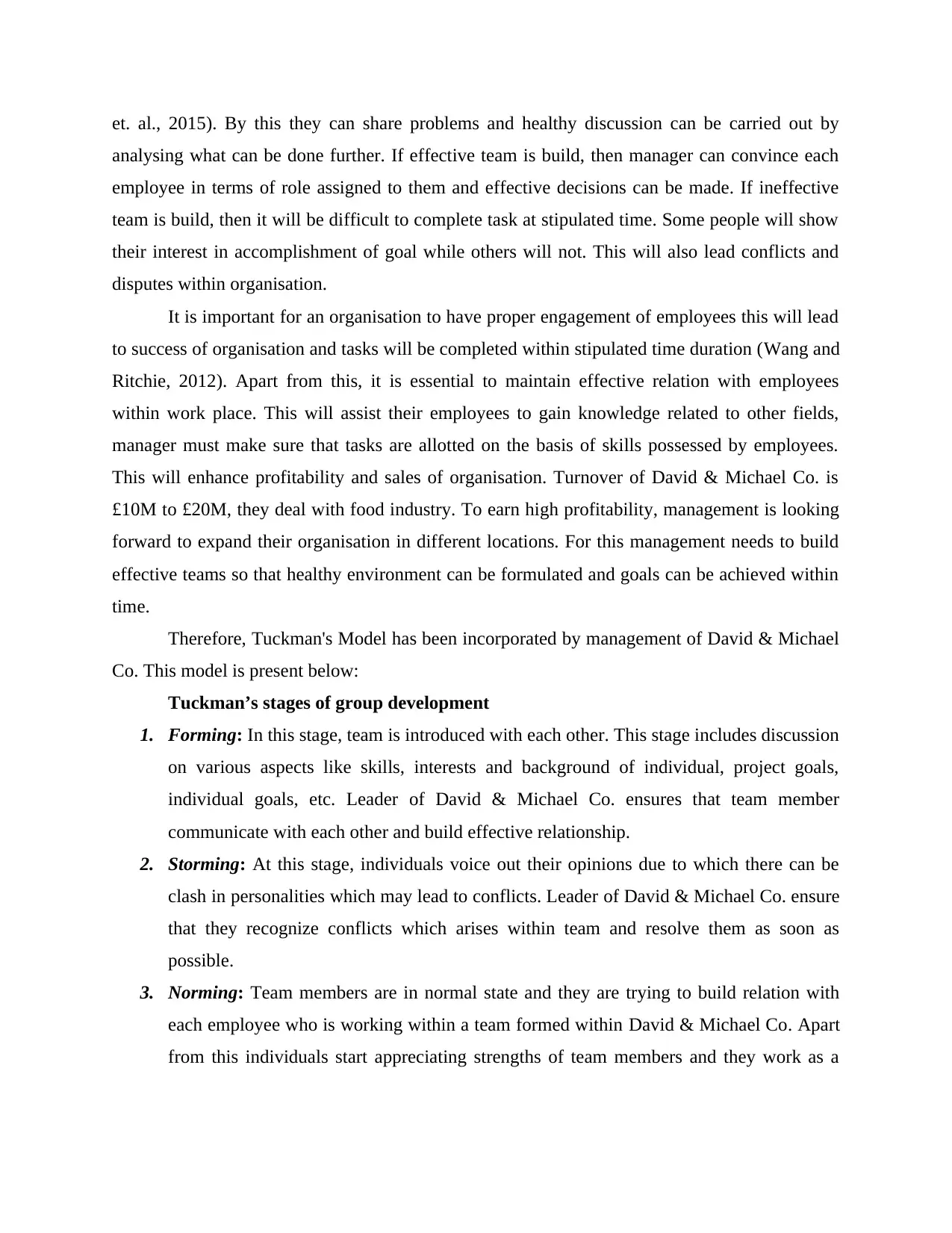
et. al., 2015). By this they can share problems and healthy discussion can be carried out by
analysing what can be done further. If effective team is build, then manager can convince each
employee in terms of role assigned to them and effective decisions can be made. If ineffective
team is build, then it will be difficult to complete task at stipulated time. Some people will show
their interest in accomplishment of goal while others will not. This will also lead conflicts and
disputes within organisation.
It is important for an organisation to have proper engagement of employees this will lead
to success of organisation and tasks will be completed within stipulated time duration (Wang and
Ritchie, 2012). Apart from this, it is essential to maintain effective relation with employees
within work place. This will assist their employees to gain knowledge related to other fields,
manager must make sure that tasks are allotted on the basis of skills possessed by employees.
This will enhance profitability and sales of organisation. Turnover of David & Michael Co. is
£10M to £20M, they deal with food industry. To earn high profitability, management is looking
forward to expand their organisation in different locations. For this management needs to build
effective teams so that healthy environment can be formulated and goals can be achieved within
time.
Therefore, Tuckman's Model has been incorporated by management of David & Michael
Co. This model is present below:
Tuckman’s stages of group development
1. Forming: In this stage, team is introduced with each other. This stage includes discussion
on various aspects like skills, interests and background of individual, project goals,
individual goals, etc. Leader of David & Michael Co. ensures that team member
communicate with each other and build effective relationship.
2. Storming: At this stage, individuals voice out their opinions due to which there can be
clash in personalities which may lead to conflicts. Leader of David & Michael Co. ensure
that they recognize conflicts which arises within team and resolve them as soon as
possible.
3. Norming: Team members are in normal state and they are trying to build relation with
each employee who is working within a team formed within David & Michael Co. Apart
from this individuals start appreciating strengths of team members and they work as a
analysing what can be done further. If effective team is build, then manager can convince each
employee in terms of role assigned to them and effective decisions can be made. If ineffective
team is build, then it will be difficult to complete task at stipulated time. Some people will show
their interest in accomplishment of goal while others will not. This will also lead conflicts and
disputes within organisation.
It is important for an organisation to have proper engagement of employees this will lead
to success of organisation and tasks will be completed within stipulated time duration (Wang and
Ritchie, 2012). Apart from this, it is essential to maintain effective relation with employees
within work place. This will assist their employees to gain knowledge related to other fields,
manager must make sure that tasks are allotted on the basis of skills possessed by employees.
This will enhance profitability and sales of organisation. Turnover of David & Michael Co. is
£10M to £20M, they deal with food industry. To earn high profitability, management is looking
forward to expand their organisation in different locations. For this management needs to build
effective teams so that healthy environment can be formulated and goals can be achieved within
time.
Therefore, Tuckman's Model has been incorporated by management of David & Michael
Co. This model is present below:
Tuckman’s stages of group development
1. Forming: In this stage, team is introduced with each other. This stage includes discussion
on various aspects like skills, interests and background of individual, project goals,
individual goals, etc. Leader of David & Michael Co. ensures that team member
communicate with each other and build effective relationship.
2. Storming: At this stage, individuals voice out their opinions due to which there can be
clash in personalities which may lead to conflicts. Leader of David & Michael Co. ensure
that they recognize conflicts which arises within team and resolve them as soon as
possible.
3. Norming: Team members are in normal state and they are trying to build relation with
each employee who is working within a team formed within David & Michael Co. Apart
from this individuals start appreciating strengths of team members and they work as a
Paraphrase This Document
Need a fresh take? Get an instant paraphrase of this document with our AI Paraphraser
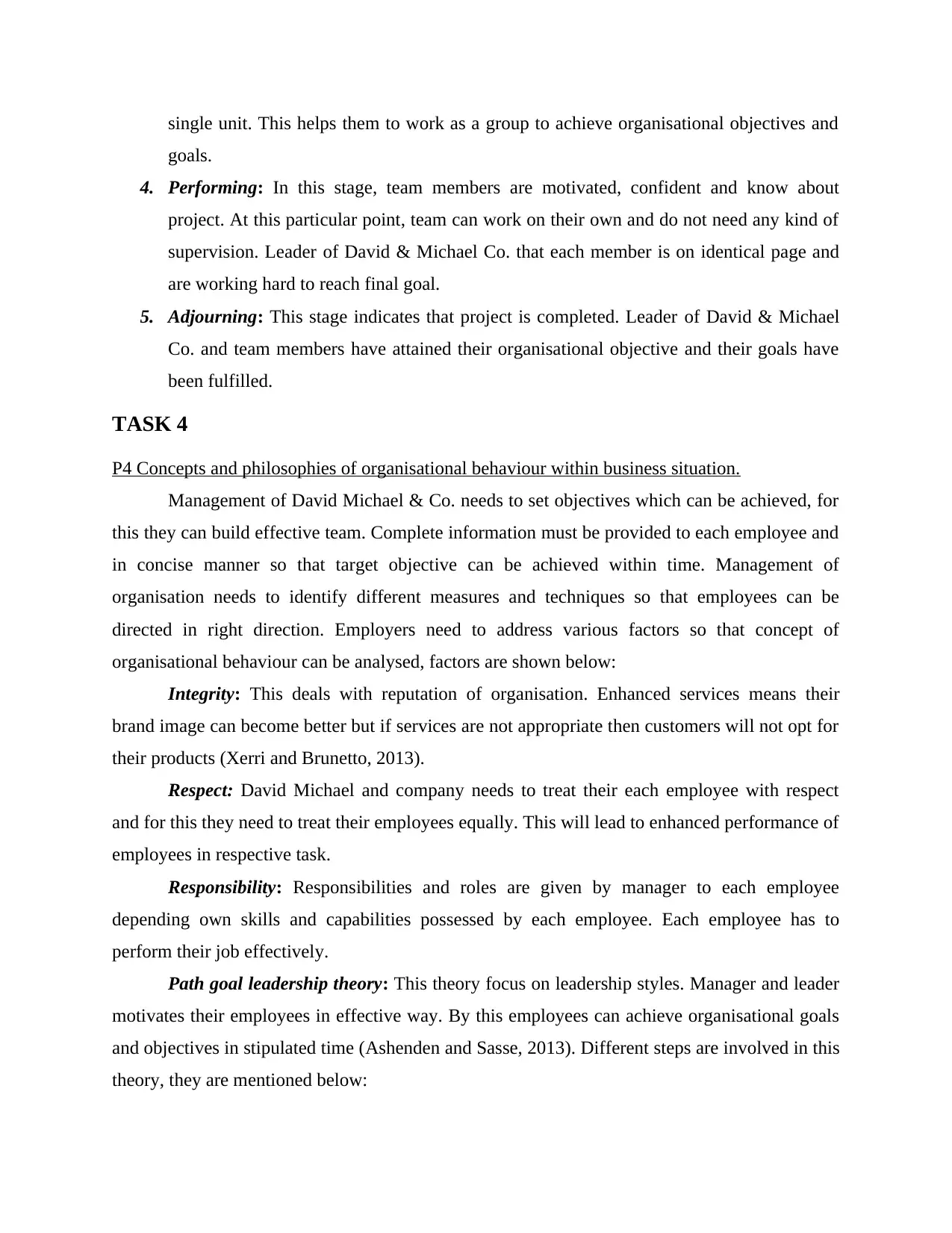
single unit. This helps them to work as a group to achieve organisational objectives and
goals.
4. Performing: In this stage, team members are motivated, confident and know about
project. At this particular point, team can work on their own and do not need any kind of
supervision. Leader of David & Michael Co. that each member is on identical page and
are working hard to reach final goal.
5. Adjourning: This stage indicates that project is completed. Leader of David & Michael
Co. and team members have attained their organisational objective and their goals have
been fulfilled.
TASK 4
P4 Concepts and philosophies of organisational behaviour within business situation.
Management of David Michael & Co. needs to set objectives which can be achieved, for
this they can build effective team. Complete information must be provided to each employee and
in concise manner so that target objective can be achieved within time. Management of
organisation needs to identify different measures and techniques so that employees can be
directed in right direction. Employers need to address various factors so that concept of
organisational behaviour can be analysed, factors are shown below:
Integrity: This deals with reputation of organisation. Enhanced services means their
brand image can become better but if services are not appropriate then customers will not opt for
their products (Xerri and Brunetto, 2013).
Respect: David Michael and company needs to treat their each employee with respect
and for this they need to treat their employees equally. This will lead to enhanced performance of
employees in respective task.
Responsibility: Responsibilities and roles are given by manager to each employee
depending own skills and capabilities possessed by each employee. Each employee has to
perform their job effectively.
Path goal leadership theory: This theory focus on leadership styles. Manager and leader
motivates their employees in effective way. By this employees can achieve organisational goals
and objectives in stipulated time (Ashenden and Sasse, 2013). Different steps are involved in this
theory, they are mentioned below:
goals.
4. Performing: In this stage, team members are motivated, confident and know about
project. At this particular point, team can work on their own and do not need any kind of
supervision. Leader of David & Michael Co. that each member is on identical page and
are working hard to reach final goal.
5. Adjourning: This stage indicates that project is completed. Leader of David & Michael
Co. and team members have attained their organisational objective and their goals have
been fulfilled.
TASK 4
P4 Concepts and philosophies of organisational behaviour within business situation.
Management of David Michael & Co. needs to set objectives which can be achieved, for
this they can build effective team. Complete information must be provided to each employee and
in concise manner so that target objective can be achieved within time. Management of
organisation needs to identify different measures and techniques so that employees can be
directed in right direction. Employers need to address various factors so that concept of
organisational behaviour can be analysed, factors are shown below:
Integrity: This deals with reputation of organisation. Enhanced services means their
brand image can become better but if services are not appropriate then customers will not opt for
their products (Xerri and Brunetto, 2013).
Respect: David Michael and company needs to treat their each employee with respect
and for this they need to treat their employees equally. This will lead to enhanced performance of
employees in respective task.
Responsibility: Responsibilities and roles are given by manager to each employee
depending own skills and capabilities possessed by each employee. Each employee has to
perform their job effectively.
Path goal leadership theory: This theory focus on leadership styles. Manager and leader
motivates their employees in effective way. By this employees can achieve organisational goals
and objectives in stipulated time (Ashenden and Sasse, 2013). Different steps are involved in this
theory, they are mentioned below:
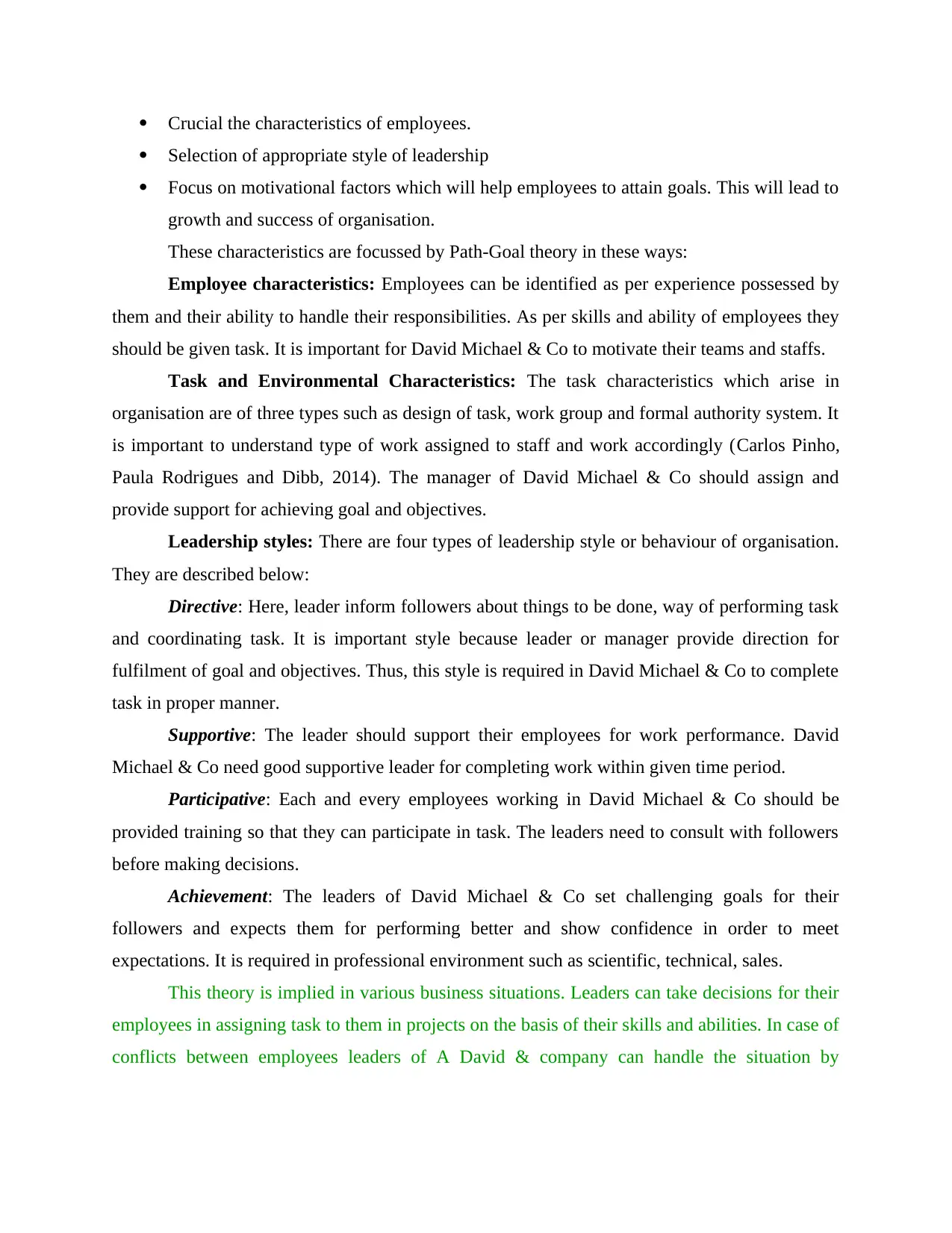
Crucial the characteristics of employees.
Selection of appropriate style of leadership
Focus on motivational factors which will help employees to attain goals. This will lead to
growth and success of organisation.
These characteristics are focussed by Path-Goal theory in these ways:
Employee characteristics: Employees can be identified as per experience possessed by
them and their ability to handle their responsibilities. As per skills and ability of employees they
should be given task. It is important for David Michael & Co to motivate their teams and staffs.
Task and Environmental Characteristics: The task characteristics which arise in
organisation are of three types such as design of task, work group and formal authority system. It
is important to understand type of work assigned to staff and work accordingly (Carlos Pinho,
Paula Rodrigues and Dibb, 2014). The manager of David Michael & Co should assign and
provide support for achieving goal and objectives.
Leadership styles: There are four types of leadership style or behaviour of organisation.
They are described below:
Directive: Here, leader inform followers about things to be done, way of performing task
and coordinating task. It is important style because leader or manager provide direction for
fulfilment of goal and objectives. Thus, this style is required in David Michael & Co to complete
task in proper manner.
Supportive: The leader should support their employees for work performance. David
Michael & Co need good supportive leader for completing work within given time period.
Participative: Each and every employees working in David Michael & Co should be
provided training so that they can participate in task. The leaders need to consult with followers
before making decisions.
Achievement: The leaders of David Michael & Co set challenging goals for their
followers and expects them for performing better and show confidence in order to meet
expectations. It is required in professional environment such as scientific, technical, sales.
This theory is implied in various business situations. Leaders can take decisions for their
employees in assigning task to them in projects on the basis of their skills and abilities. In case of
conflicts between employees leaders of A David & company can handle the situation by
Selection of appropriate style of leadership
Focus on motivational factors which will help employees to attain goals. This will lead to
growth and success of organisation.
These characteristics are focussed by Path-Goal theory in these ways:
Employee characteristics: Employees can be identified as per experience possessed by
them and their ability to handle their responsibilities. As per skills and ability of employees they
should be given task. It is important for David Michael & Co to motivate their teams and staffs.
Task and Environmental Characteristics: The task characteristics which arise in
organisation are of three types such as design of task, work group and formal authority system. It
is important to understand type of work assigned to staff and work accordingly (Carlos Pinho,
Paula Rodrigues and Dibb, 2014). The manager of David Michael & Co should assign and
provide support for achieving goal and objectives.
Leadership styles: There are four types of leadership style or behaviour of organisation.
They are described below:
Directive: Here, leader inform followers about things to be done, way of performing task
and coordinating task. It is important style because leader or manager provide direction for
fulfilment of goal and objectives. Thus, this style is required in David Michael & Co to complete
task in proper manner.
Supportive: The leader should support their employees for work performance. David
Michael & Co need good supportive leader for completing work within given time period.
Participative: Each and every employees working in David Michael & Co should be
provided training so that they can participate in task. The leaders need to consult with followers
before making decisions.
Achievement: The leaders of David Michael & Co set challenging goals for their
followers and expects them for performing better and show confidence in order to meet
expectations. It is required in professional environment such as scientific, technical, sales.
This theory is implied in various business situations. Leaders can take decisions for their
employees in assigning task to them in projects on the basis of their skills and abilities. In case of
conflicts between employees leaders of A David & company can handle the situation by
⊘ This is a preview!⊘
Do you want full access?
Subscribe today to unlock all pages.

Trusted by 1+ million students worldwide
1 out of 15
Related Documents
Your All-in-One AI-Powered Toolkit for Academic Success.
+13062052269
info@desklib.com
Available 24*7 on WhatsApp / Email
![[object Object]](/_next/static/media/star-bottom.7253800d.svg)
Unlock your academic potential
Copyright © 2020–2026 A2Z Services. All Rights Reserved. Developed and managed by ZUCOL.





